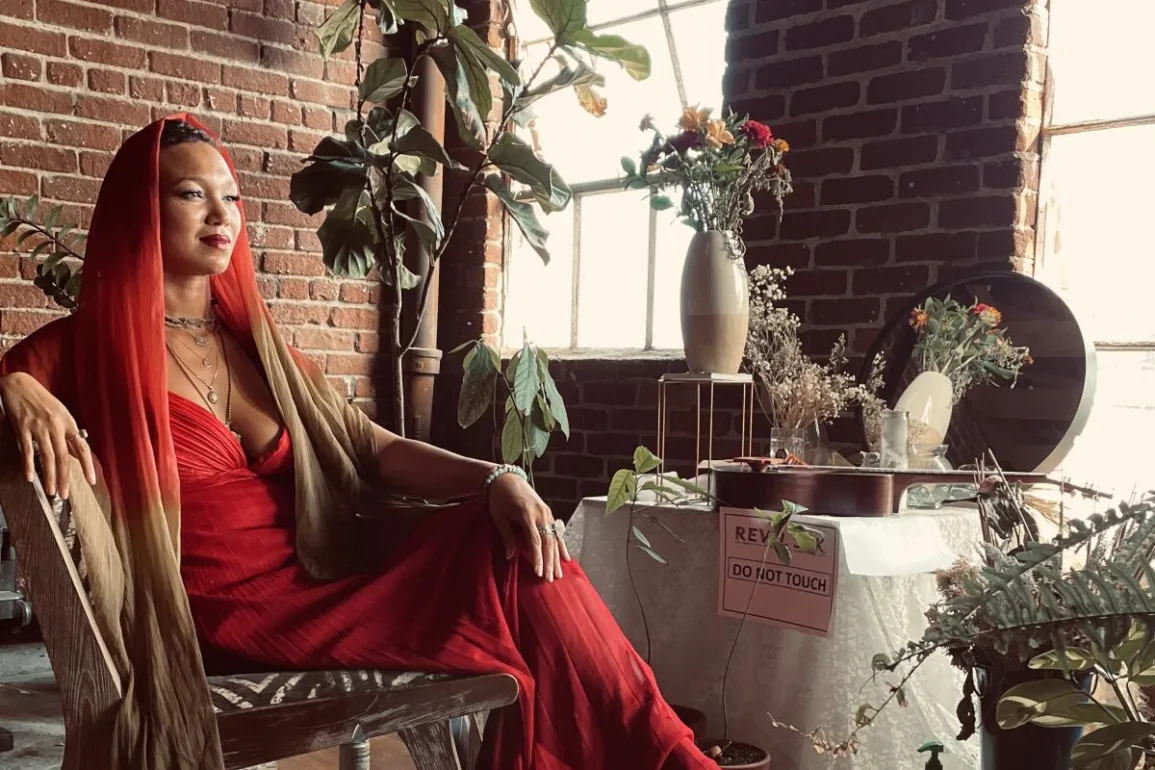When Shelley Bruce was first offered the lease of the top floor of a stunning 11,200-square-feet exposed brick loft in downtown L.A.’s Arts District in December 2021, she did not imagine it one day becoming her own BIPOC community center.
“It was kind of still the pandemic and I was like, ‘You all must be crazy! How much is that?’” says Bruce, who has worked for years as a community organizer and activist. But by the following summer, she had turned the wood-beamed loft into the Heart Department — part profitable event rental space, part donation-based gathering place hosting free wine tastings, classical music concerts, Village of Mothers support groups, Black men’s healing circles, queer programming events and workshops for sexual-violence survivors. “There are so many communities that can’t afford their own space, so we give it to them for free or at highly discounted rates.”

Shelley Bruce opened the Heart Department in downtown Los Angeles as a community space, and is facing challenges to stay open.
(Heart Department)
In January, the bottom floor of the building became available, and Bruce found herself in what she described as a catch-22. “If I didn’t take the bottom floor of the building, I might lose everything entirely because the landlord wanted one tenant on the whole lease of building,” she says. “It has very much been a struggle.” Now, even after months of fundraising, what has become a thriving BIPOC haven and social justice center is facing a crisis to maintain its location.
The Heart Department is one of four businesses in L.A. that Prosperity Market, a mobile farmers market and Black-owned business advocate, has chosen as a recipient for a fundraising initiative called “It’s Bigger Than Us,” with the goal to reach $100,000 in grants. Other recipients are Jefferson Park’s wildly popular plant shop and gathering place, the Plant Chica; documentary filmmaker Rhasaan Nichols’ California Coffee Co.; and veteran-owned Lazy Rose Cafe on La Brea. All have prioritized community outreach, and all are facing imminent struggles to stay open or reopen in new locations.
“We are seeing business after business. These are four examples. But there are many other businesses that we’ve seen with the same story,” says Carmen Dianne, co-founder of Prosperity Market. “They’re either losing their locations or they have to close or their building is being sold.” Though there are many others with similar struggles, Dianne and co-founder Kara Still chose these four based on their relationships with them and their extensive community outreach.
“I think that there is a common thread between all of them,” says Dianne. “They are all very much community focused, so supporting these four businesses reaches much further than that, because of all of the businesses that they support.” She says that California Coffee Co. and Lazy Rose Cafe sell other black-owned products in their shops.
The Plant Chica owner Sandra Mejia and her husband Bantalem Adis were recently forced to move out of the 4,500-square-feet plant store they had paid to convert from an auto body shop into a greenhouse.
“The neighborhood kids think that Santa Claus lives at the Plant Chica,” says Mejia, stressing how important the shop’s physical location was to her community. They hosted at least six events every month. “Everything we do is always free,” she says, mentioning wellness days with yoga and meditation, flower arrangement classes and story time for kids.




Sandra Mejia, left, and her husband, Bantalem Adis, own the Plant Chica and recently had to leave the store they converted from an auto body shop in West Adams.
(Christina House / Los Angeles Times)
But the impetus for this initiative stems not only from a clear need from these beloved local businesses, but also from a broader trend that the women behind Prosperity Market want to shed light on. “During the pandemic, we saw all this support, and now here we are three years later, and it’s like, what happened? Where did that support go? It really wasn’t sustainable. And we really wanted to tell that story.
This is the reality of what black businesses are facing right now,” says Dianne who, with Still, founded Prosperity Market after witnessing 41% of Black-owned businesses close during the early months of the pandemic in 2020 and grocery store lines grow longer.
“Especially after George Floyd’s murder, there was this pendulum swing of support to find and shop Black-owned businesses, organizations committing to helping Black entrepreneurs open their businesses and funding coming through to kind of offset all of the tragedy that had happened during that time,” says Still. “And that’s great. But I guess the pendulum has to swing back before it starts to settle, right? And so what we are seeing now is that that’s not as high on the list of priorities in the conversation. Some of those funding avenues aren’t necessarily as available.”
To counter that, Dianne and Still are partnering with the Black Cooperative Impact Fund, a nonprofit lender that generally offers zero-interest micro loans to Black-owned businesses in Southern California. In the case of “It’s Bigger Than Us,” BCIF will be delivering grant money to the four businesses.
“We see that the applicants oftentimes can’t get funded elsewhere and that’s really just a microcosm of the Black business community nationwide,” BCIF President Robert Lewis says. “The data tells us that about 40% to 50% of Black businesses are typically funded through personal means, friends and family.”
Such is the case for Erdavria Rose Simpson of the Lazy Rose Cafe. Simpson, an Army veteran whose day job is as a project management analyst for Millennium Space Systems, described spending more than $100,000 of her own money for her cafe’s build-out.
“Unfortunately, with rent increasing, with us putting our personal dollars into the business, I don’t have a savings anymore,” says Simpson, who is grappling with rent prices and watching the stores around her become boarded up. “We’ve applied to 54 grants. We haven’t gotten any.”
For Simpson, this included Paycheck Protection Program loans. According to a survey from the Federal Reserve Bank, only 43% of Black-owned businesses who applied received PPP funding while 79% of white owners received help. “I’m trying to save the business 1,000%. That means maybe we become a Black cafe coalition where other shops can set up home here.”
Nichols, who hired a lawyer after his California Coffee Co. was evicted from a mall in Sherman Oaks, hopes to be part of said coalition. “My reserve money went into doing a legal battle,” he says. “This fundraiser will help us pivot. I really want to make coffee again.”
Bruce of the Heart Department is optimistic. “I think the challenge I’m having that I’m so grateful for Prosperity Market for is, I do genuinely feel that as a Black young woman, it’s a bit harder for me to find the right investment capital, and sometimes be taken as seriously,” she says. “The Prosperity Market fundraising is going to help us close the gap.”
“It’s Bigger Than Us” coincides with Prosperity Market’s annual August Black Business Scavenger Hunt, a nearly monthlong public competition that, this year, highlights over 70 Black-owned businesses all over L.A. and allows customers to earn points for shopping. The scavenger hunt culminates with a celebratory pop-up farmers market from 11 a.m. to 3 p.m. on Aug. 27 at Hollywood Park with the business owners in attendance.



